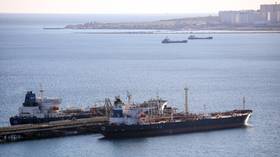Western states still buying Russian oil and gas – minister
Those who sanctioned Moscow now rely on “workarounds” to get the country’s energy, Nikolay Shulginov says
Western nations have not stopped buying Russian energy despite the unprecedented sanctions imposed by the US and the EU against Moscow, Russian Energy Minister Nikolay Shulginov has said. These nations have just switched to “workarounds” to procure Russian imports, he told the Russia 1 TV channel.
When asked if Western countries were still buying Russian oil and gas but through alternative routes, Shulginov said this information was “correct.” However, he did not elaborate on which specific routes are used to deliver Russian energy to Western customers.
In December 2022, the EU, the Group of Seven nations, and their allies introduced a collective ban on Russian seaborne oil exports, along with a price cap of $60 per barrel. Another embargo banning almost all imports of Russian oil products, as well as introducing price caps on diesel and other petroleum products, kicked in on February 5.
Although Russia’s gas pipelines have not been subject to restrictions, its gas exports to the EU were drastically reduced following the sabotage in September 2022 of the Nord Stream 1 and 2 undersea pipelines that rendered them inoperable. According to Politico, as of mid-May, a consensus had still not been reached in the EU on whether Russian gas pipelines should be sanctioned.
In March, Bloomberg reported that some EU nations had been actively purchasing Russian liquefied natural gas (LNG), with Spain topping the list of buyers in early 2023. Spain’s imports of Russian LNG had soared by 84% since the start of the conflict in Ukraine.
France has also emerged as a major Russian LNG importer, purchasing 1.9 million metric tons of the fuel in 2022. It was followed by Spain, which bought 533,800 metric tons, and Belgium, which acquired 310,000 metric tons over the same period, according to Bloomberg.
Spain was also the largest importer of Russian fossil fuels between January 1 and March 9 of this year, the news agency said. It was closely followed by Belgium and Bulgaria.
In early May, the EU suggested prohibiting ships that have violated sanctions on Russian oil from entering EU ports and waterways as part of a new sanctions package. Later, the EU’s foreign policy chief, Josep Borrell, called on the bloc to ban Indian fuel produced from Russian oil.
India’s own crude imports from Russia rose tenfold in the financial year ending March 31, Bank of Baroda, the nation’s second-largest public sector lender, said in May. Amid the Western sanctions, Russia has redirected its oil exports to other parts of the world, particularly Asia and Latin America.







Comments are closed.